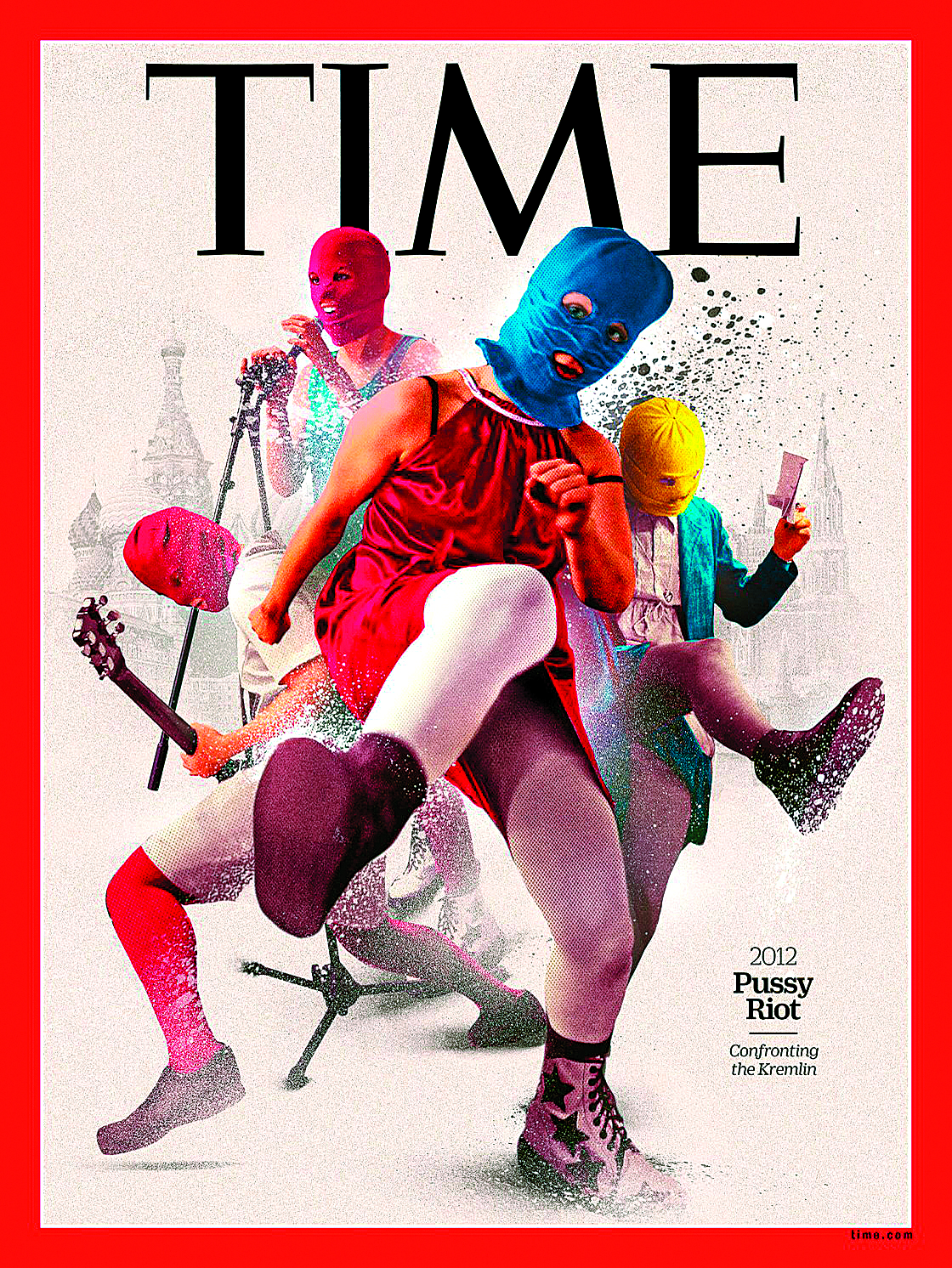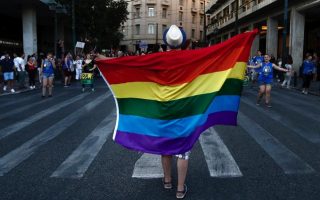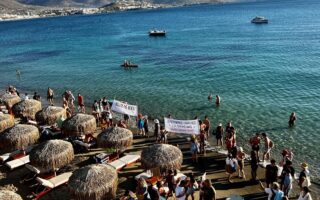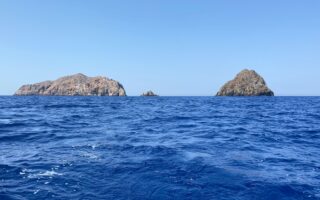Pussy Riot founder talks to Kathimerini about Russia’s ‘military dictatorship’ ahead of visit to Athens
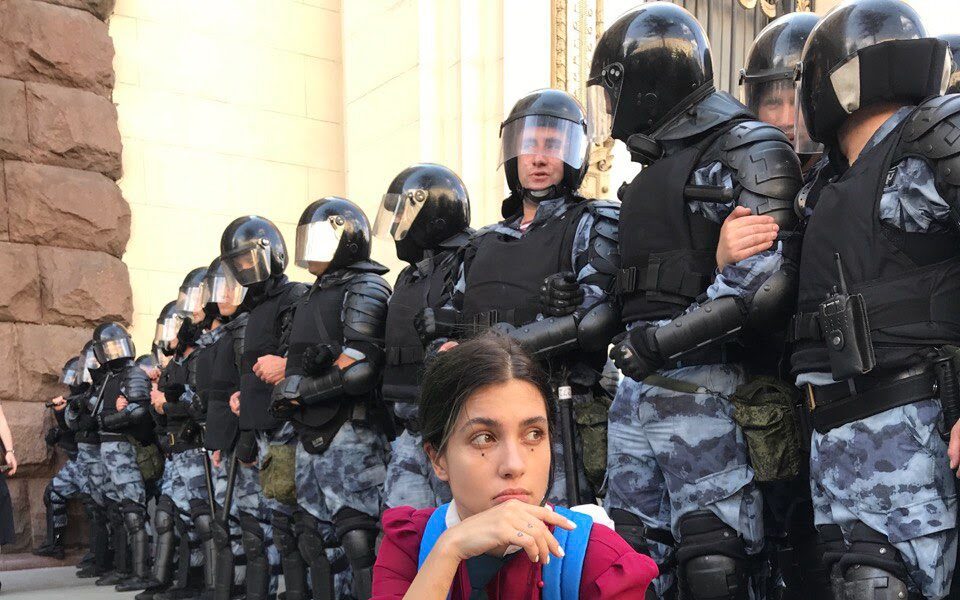
What is it like to live in constant fear of attack or imprisonment by the Russian state? The very harsh reality is described to Kathimerini by the creator of the Russian feminist protest art collective Pussy Riot, Nadya Tolokonnikova.
In February 2012 she became popular when, at the age of 23, she staged a performance with four other members of Pussy Riot in the interior of the Cathedral of Christ the Savior in Moscow. Wearing colorful hoods, the Russian feminists protested against the leadership of the Russian Orthodox Church, which openly supported President Vladimir Putin. The act was described as “hooliganism motivated by religious hatred,” with her and two of her companions sentenced to two years in prison. However, prison and psychological warfare did not deter her from continuing her fight to promote feminism and LGBTQ rights in Russian society, with her views leading her to be labeled a “foreign agent” by the Russian Ministry of Justice and placed on the list of “most wanted criminal suspects.”
Today, and after the death of dissident Alexei Navalny, Tolokonnikova continues her fight against what she calls the “military dictatorship.” Ahead of a visit to Athens on Sunday where she will be speaking at the Stavros Niarchos Cultural Center (SNFCC), in the framework of the Women of the World (WOW) festival, the creator of Pussy Riot describes what it is like to spend time in Russian prisons.
Μany people got to know Pussy Riot through the pictures with the colorful hoods, the demonstrations in the streets, and the performance at the Cathedral of Christ the Savior in Moscow that led you to imprisonment. Through your perspective, what does Pussy Riot represent and what messages are you trying to get across to the public?
Pussy Riot is a movement against dictatorship, pro-feminist and pro-LGBTQ. We started in 2011 and we always believed that it is important to combine those anti-Putin, pro-queer, and pro-feminism messages. And it is proven to be very needed today because the LGBTQ movement was added to the list of extremists and terrorists in Russia, which is very dangerous. And it is starting to affect people on a daily basis and not just directly those who are punished by law and thrown in jail because they are just running a gay party, but also people who just happen to have short hair, as happened recently in Russia where there was a case of women who were beaten simply because they had short hair.
Recently you wrote in The New York Times that with the death of Alexei Navalny, “a new sense of responsibility has been born.” As one of his friends, what did Navalny’s work represent and what is his legacy?
Navalny represented hope and this is the reason why a lot of people say that with Navalny’s death, hope has died. He was able to lead with love and I would dare to say joy, which is very difficult while you are being harassed and arrested, your loved ones are being thrown into jail on a daily basis. Navalny managed to have this open and very real smile because he was special in a way that he knew that the truth was on his side and he was going to win no matter what, no matter how many tanks and how much ammunition the other party had in their hands. And this brings us to another characteristic of him, his fearlessness.
Navalny made oppositional politics and oppositional activism seem easy and doable. He was just smiling and laughing and you could see that he had very real connections with people around him, with his team. Usually, we expect a politician to be empathetic, and to be able to form friendships and a family. Putin is the opposite of that. We do not know if he has friends, he does not have family, he hides his children and his lovers. He is basically a monster. So, I think people in Russia really have a big need for an emotionally available and mature person to be a leader.
Are you afraid that Russia might turn into an illiberal society without civil rights?
‘Navalny represented hope and this is the reason why a lot of people say that with Navalny’s death, hope has died’
Right now, it is already a military dictatorship.
In 2012 you were arrested for “hooliganism motivated by religious hatred” and sentenced to two years in prison. In the Western world, we have heard a lot about the conditions and torture in Russian prisons, including the abuse of women. What were your experiences in prison?
It was horrific. It was the worst episode of my life and I am still struggling to fully recover emotionally from it. I was not tortured or beaten or poisoned physically; it was a different time. Russia was an autocracy, but it was not like a full-blown military dictatorship. So, my conditions were pretty different from what Navalny had to withstand. But the full-blown psychological emotional violence was used against me on a daily basis. It was hard and sick and it was happening for two years. My friends were punished for being friends with me in jail, or the whole unit was denied calls to their relatives and denied some other sorts of rights, like even washing themselves. And then it is not only the administration that turned against me but also some prisoners who believed the administration that it was actually because of me that they got punished and not because of the actual abuser which was the administration.
Moreover, the prison had very poor working and living conditions. You know, the prison system has not been reformed since the Soviet times and it is still the same gulag system in principle in the way Stalin built it. There was forced labor of prisoners and the people around me had to work for 16 hours a day. I worked for eight, just because I was known and they did not want me to overwork, but I had to perform the same quota in the same eight hours, which was completely impossible, which would add an additional layer of pure craziness. Imagine you had to produce 300 operations in eight hours that other people did in 16.
At the age of just 34, how does it feel to have an entire state label you a “public danger” and a “criminal”?
It feels bad. But I feel it is like a badge of honor. When they threw me in jail, I did not realize the full reality of it. For the first month or two, I thought I was just part of a tradition of great Russian revolutionaries who changed the world. I mean, at least they gave some hope to the world. Of course, not a lot of them succeeded historically in Russia. But then just the reality caught up with me and you should know that it is very dangerous and bad for you, especially in terms of mental health, because you start to question if there is something wrong with you and you start to internalize it. And some people cope with it differently. Some people joke about it. This situation upsets me very much at times, especially when I am low. I have depressive disorder and when I receive hundreds of Russian bots attacking me on a daily basis on social media you can understand how I feel.
Do you fear for your life or have you received threats from Putin’s government or his followers?
I do. I receive dozens of death threats every day. I mean, I guess at this point I do not really take them seriously because I cannot take any practical steps to minimize the danger. But obviously, the danger is very real.
You know, my ex-husband was poisoned and he survived by chance. We were able to bring him to Germany for treatment. He was poisoned with a nerve agent. Friends of mine like Elena Kostenko, a brave journalist, who happens to be a lesbian and wrote a bestseller, she was poisoned. Another friend of mine, from Navalny’s team, Lyubov Sobol, was poisoned. So, you have this feeling that the circle is closing in on you. But again, I prefer not to think about it because then you let fear dictate your actions. And also, I think the political prisoners who are actually inside Russia or political activists who are still inside Russia, are in much greater danger. So, actually, I think we should be talking mostly about them.
You will be in Athens on Sunday to talks about, among other things, the feminist movement and contemporary women’s empowerment. What do you envision as the future of activism, particularly in Russia?
I am from the country that gave the world [Pyotr Alexeyevich] Kropotkin and [Mikhail Alexandrovich] Bakunin and those great anarchist writers wrote a lot about the primal human instinct of helping each other. And I think we just need to tap more into that and at the same time it helps us to become stronger.
Also, I think building an international movement, or at least international connections and alliances, really helps. We always wanted to be an international movement. And so, we have collaborated with chapters of people who identify as Pussy Riot members from Buenos Aires to Mexico City and Hong Kong. Therefore, we really believe that to tackle global problems and global injustices, you need to build global alliances. So that is why I am really happy to come to Athens.
